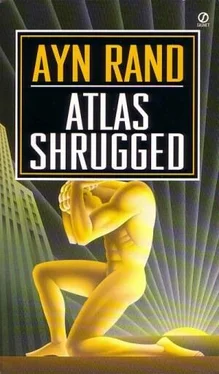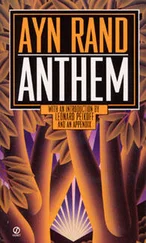It was then that a distant shape had come swimming forward in his mind: the image of a mushroom-domed structure in the middle of an Iowa plain.
All images had begun to fuse in his mind thereafter. Project X—he had thought, not knowing whether it was the vision of that structure or of a feudal castle commanding the countryside, that gave him the sense of an age and a world to which he belonged. . . . I'm Robert Stadler —he had thought—it's my property, it came from my discoveries, they said it was I who invented it. . . . I'll show them!—he had thought, not knowing whether he meant the man on the window sill or the others or the whole of mankind. . . . His thoughts had become like chips floating in a liquid, without connections: To seize control . . .
I'll show them! . . . To seize control, to rule . . . There is no other way to live on earth. . . .
These had been the only words that named the plan in his mind. He had felt that the rest was clear to him—clear in the form of a savage emotion crying defiantly that he did not have to make it clear. He would seize control of Project X and he would rule a part of the country as his private feudal domain. The means? His emotion had answered: Somehow. The motive? His mind had repeated insistently that his motive was terror of Mr. Thompson's gang, that he was not safe among them any longer, that his plan was a practical necessity. In the depth of his liquid brain, his emotion had held another kind of terror, drowned along with the connections between his broken chips of words.
These chips had been the only compass directing his course through four days and nights—while he drove down deserted highways, across a country collapsing into chaos, while he developed a monomaniac's cunning for obtaining illegal purchases of gas, while he snatched random hours of restless sleep, in obscure motels, under assumed names. . . .
I'm Robert Stadler—he had thought, his mind repeating it as a formula of omnipotence. . . . To seize control—he had thought, speeding against the futile traffic lights of half-abandoned towns—speeding on the vibrating steel of the Taggart Bridge across the Mississippi—speeding past the occasional ruins of farms in the empty stretches of Iowa. . . . I'll show them—he had thought—let them pursue, they won't stop me this time. . . . He had thought it, even though no one had pursued him—as no one was pursuing him now, but the taillights of his own car and the motive drowned in his mind.
He looked at his silent radio and chuckled; the chuckle had the emotional quality of a fist being shaken at space. It's I who am practical—he thought—I have no choice . . . I have no other way . . . I'll show all those insolent gangsters, who forget that I am Robert Stadler . . . They will all collapse, but I won't! . . . I'll survive! . . . I'll win! . . . I'll show them!
The words were like chunks of solid ground in his mind, in the midst of a fiercely silent swamp; the connections lay submerged at the bottom.
If connected, his words would have formed the sentence: I'll show him that there is no other way to live on earth! . . .
The scattered lights in the distance ahead were the barracks erected on the site of Project X, now known as Harmony City. He observed, as he came closer, that something out of the ordinary was going on at Project X, The barbed-wire fence was broken, and no sentinels met him at the gate. But some sort of abnormal activity was churning in the patches of darkness and in the glare of some wavering spotlights: there were armored trucks and running figures and shouted orders and the gleam of bayonets. No one stopped his car. At the corner of a shanty, he saw the motionless body of a soldier sprawled on the ground.
Drunk—he thought, preferring to think it, wondering why he felt unsure of it.
The mushroom structure crouched on a knoll before him; there were lights in the narrow slits of its windows—and the shapeless funnels protruded from under its dome, aimed at the darkness of the country. A soldier barred his way, when he alighted from his car at the entrance.
The soldier was properly armed, but hatless, and his uniform seemed too sloppy. "Where are you going, bud?" he asked.
"Let me in!" Dr. Stadler ordered contemptuously.
"What's your business here?"
"I'm Dr. Robert Stadler."
"I'm Joe Blow. I said, What's your business? Are you one of the new or one of the old?"
"Let me in, you idiot! I'm Dr. Robert Stadler!"
It was not the name, but the tone of voice and the form of address that seemed to convince the soldier. "One of the new," he said and, opening the door, shouted to somebody inside, "Hey, Mac, take care of Grandpaw here, see what he wants!"
In the bare, dim hall of reinforced concrete, he was met by a man who might have been an officer, except that his tunic was open at the throat and a cigarette hung insolently in the corner of his mouth.
"Who are you?" he snapped, his hand jerking too swiftly to the holster on his hip.
"I'm Dr. Robert Stadler."
The name had no effect. "Who gave you permission to come here?"
"I need no permission."
This seemed to have an effect; the man removed the cigarette from his mouth. "Who sent for you?" he asked, a shade uncertainly.
"Will you please let me speak to the commandant?" Dr. Stadler demanded impatiently.
"The commandant? You're too late, brother."
"The chief engineer, then!"
"The chief-who? Oh, Willie? Willie's okay, he's one of us, but he's out on an errand just now."
There were other figures in the hall, listening with an apprehensive curiosity. The officer's hand summoned one of them to approach—an unshaved civilian with a shabby overcoat thrown over his shoulders.
"What do you want?" he snapped at Stadler, "Would someone please tell me where are the gentlemen of the scientific staff?" Dr. Stadler asked in the courteously peremptory tone of an order.
The two men glanced at each other, as if such a question were irrelevant in this place. "Do you come from Washington?" the civilian asked suspiciously.
"I do not. I will have you understand that I'm through with that Washington gang."
"Oh?" The man seemed pleased. "Are you a Friend of the People, then?"
"I would say that I'm the best friend the people ever had. I'm the man who gave them all this." He pointed around him.
"You did?" said the man, impressed. "Are you one of those who made a deal with the Boss?"
"I'm the boss here, from now on,"
The men looked at each other, retreating a few steps. The officer asked, "Did you say the name was Stadler?"
"Robert Stadler, And if you don't know what that means, you'll find out!"
"Will you please follow me, sir?" said the officer, with shaky politeness.
What happened next was not clear to Dr. Stadler, because his mind refused to admit the reality of the things he was seeing. There were shifting figures in half-lighted, disordered offices, there were too many firearms on everybody's hips, there were senseless questions asked of him by jerky voices that alternated between impertinence and fear.
He did not know whether any of them tried to give him an explanation; he would not listen; he could not permit this to be true. He kept stating in the tone of a feudal sovereign, "I'm the boss here, from now on . . . I give the orders . . . I came to take over . . . I own this place.
. . . I am Dr. Robert Stadler—and if you don't know that name in this place, you have no business being here, you infernal idiots! You'll blow yourselves to pieces, if that's the' state of your knowledge! Have you had a high-school course in physics? You don't look to me as if you've ever been allowed inside a high school, any of you! What are you doing here? Who are you?"
It took him a long time to grasp—when his mind could not block it any longer—that somebody had beaten him to his plan: somebody had held the same view of existence as his own and had set out to achieve the same future. He grasped that these men, who called themselves the Friends of the People, had seized possession of Project X, tonight, a few hours ago, intending to establish a reign of their own. He laughed in their faces, with bitterly incredulous contempt, "You don't know what you're doing, you miserable juvenile delinquents! Do you think that you—you!—can handle a high-precision instrument of science? Who is your leader? I demand to see your leader!"
Читать дальше










